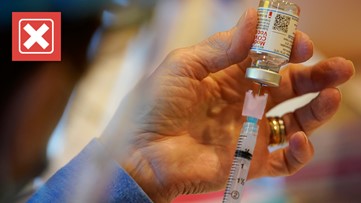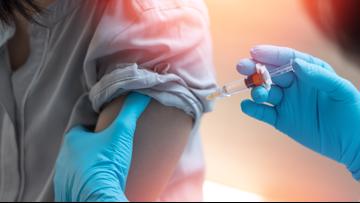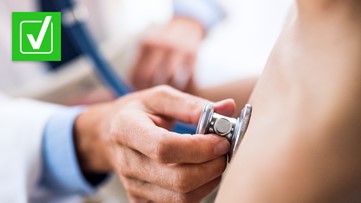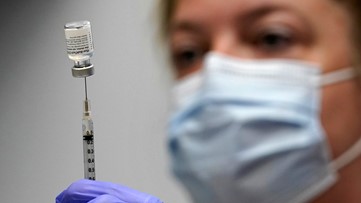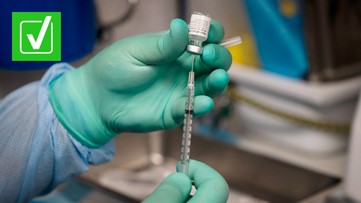The Centers for Disease Control and Prevention (CDC) says obesity increases the risk of severe illness from COVID-19, potentially tripling the risk of hospitalization due to a COVID-19 infection. Considering the increased risk of severe illness, the COVID-19 vaccines are critical in protecting people with obesity.
There has also been speculation in the media about whether obesity would reduce the effectiveness of the COVID-19 vaccines.
THE QUESTION
VERIFY viewer Madison asked: Does obesity reduce the efficacy of the COVID-19 vaccines?
THE SOURCES
- Dr. Fatima Cody Stanford, obesity medicine physician scientist, educator and policy maker at Massachusetts General Hospital and Harvard Medical School.
- U.S. Food and Drug Administration (FDA)
- Richard Kennedy, professor of medicine and co-director of the Mayo Clinic Vaccine Research Group.
THE ANSWER
No, obesity did not reduce the efficacy of the COVID-19 vaccines in clinical trials, although further studies are limited.
WHAT WE FOUND
The CDC, citing data from a 2017-18 National Health and Nutrition Examination Survey, says an estimated 42% of American adults ages 20 and over have obesity, including 9% with severe obesity. Body mass index (BMI), a measure of body fat based on height and weight, is used to determine obesity and severe obesity. The CDC says anyone with a BMI at or above 30 has obesity and anyone with a BMI at 40 or above has severe obesity.
Richard Kennedy, professor of medicine and co-director of the Mayo Clinic Vaccine Research Group, says obesity affects how other vaccines, such as the flu vaccine, protect people. He said it’s not yet fully known how obesity may impact the efficacy of the COVID-19 vaccines.
Dr. Fatima Cody Stanford, an obesity medicine physician scientist, educator and policy maker at Massachusetts General Hospital and Harvard Medical School, says the vaccines authorized for emergency use in the U.S. were effective in clinical trials regardless of a person’s weight.
“The Pfizer, Moderna and J&J [Johnson & Johnson] vaccines were shown to have similar efficacy in patients with and without obesity,” she said.
Stanford was one of three authors of an article in The Obesity Society’s journal about the effectiveness of the COVID-19 vaccines for people with obesity. The authors examined Phase 3 clinical trial data, published by the FDA, of the Pfizer and Moderna COVID-19 vaccines.
The Pfizer vaccine was 95% effective in preventing COVID-19 among clinical trial participants. Vaccine efficacy seven days after the second dose was 95.4% in people with obesity and 94.8% in people without obesity, according to data released by the FDA.
The vaccine developed by Moderna was 94.1% effective in preventing COVID-19 among clinical trial participants. Vaccine efficacy 14 days after the second dose was 95.8% in people with obesity and 91.2% for people with severe obesity.
The Johnson & Johnson vaccine was 67% effective among trial participants in preventing moderate to severe/critical COVID-19 occurring at least 14 days after vaccination and 66% effective in preventing moderate to severe/critical COVID-19 occurring at least 28 days after vaccination. For people with obesity, vaccine efficacy was 66.8% at least 14 days after vaccination and 65.9% at least 28 days after vaccination.
“This was studied diligently in the approved vaccines in the U.S. for patients with obesity during the clinical trials,” Stanford said.
Kennedy said the efficacy in clinical trials for people with obesity is reassuring, but there isn’t much information from other studies.
He said preliminary data from a small study of about 250 health care workers found that antibody responses in people with obesity were lower seven days after receiving their second dose of the Pfizer vaccine. But that doesn’t mean vaccine efficacy was reduced.
“The reduction wasn’t that large, and we don’t have a correlate of protection for COVID-19 so we cannot rule out the possibility that the lower antibody response is still enough to protect from disease or infection,” Kennedy said.
Stanford and Kennedy said people with obesity who are concerned about the effectiveness of the COVID-19 vaccines should get vaccinated.
More from VERIFY: No, you can’t get the COVID-19 vaccine from a blood transfusion
VERIFY
Our journalists work to separate fact from fiction so that you can understand what is true and false online. Please consider subscribing to our daily newsletter, text alerts and our YouTube channel. You can also follow us on Snapchat, Twitter, Instagram or Facebook.



